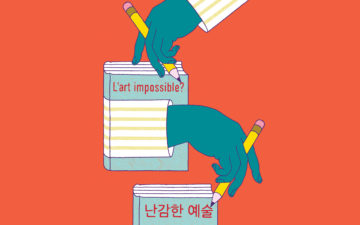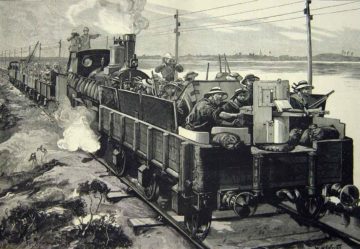by Claire Chambers
 Rebecca F. Kuang’s new novel Yellowface, a hilarious and haunting satire about the publishing industry, is proving a literary fiction bestseller this summer. However, it is her previous book Babel, or the Necessity of Violence that interests me here. Whereas Yellowface concerns contemporary America, Babel is a capacious piece of speculative fiction mostly set in Oxford during the 1830s. It was published in the Covid-19 pandemic under the young author’s abbreviated first name, and was a surprise hit due in part to its popularity on BookTok. As I will discuss, the novel deals with issues of language, translation, and colonialism in a startlingly original way.
Rebecca F. Kuang’s new novel Yellowface, a hilarious and haunting satire about the publishing industry, is proving a literary fiction bestseller this summer. However, it is her previous book Babel, or the Necessity of Violence that interests me here. Whereas Yellowface concerns contemporary America, Babel is a capacious piece of speculative fiction mostly set in Oxford during the 1830s. It was published in the Covid-19 pandemic under the young author’s abbreviated first name, and was a surprise hit due in part to its popularity on BookTok. As I will discuss, the novel deals with issues of language, translation, and colonialism in a startlingly original way.
Protagonist Robin Swift had been born in Canton and given a Chinese name that is never disclosed. After his mother’s death in the so-called Asiatic Cholera pandemic of the late 1820s, a professor called Richard Lovell becomes his guardian for reasons initially unknown. Lovell allows the boy to choose his own name (he decides on ‘Robin’ for the bird, and ‘Swift’ from Gulliver’s Travels) before bringing him to England.
Lovell prepares Robin for admission at the prestigious Royal Institute of Translation at Oxford, known to students as Babel. Compared with the classist and white supremacist patriarchy of the rest of Oxford University in that period at least, Babel is multilingual, multicultural, and even admits girls. Here Robin makes three friends: Ramy from Calcutta, Haitian Victoire, and the English rose Letty. In the institute’s intensive language programme, the teenagers’ friendship too quickly becomes intense. Ramy, Victoire, and Robin still feel a complex loyalty to the (quasi-)colonized homelands they had to leave behind. Cracks start to emerge in their relationship with Letty, who holds sympathy for the British civilizing mission.
T he magical Oxford portrayed in Babel is reminiscent of Hogwarts, if J. K. Rowling spoke five languages and had a PhD in postcolonial studies. In its ivory towers, these young adults encounter the linguistic ideas of the Anglicist Thomas B. Macaulay (1800–59) and Orientalist William Jones (1746–94), with the latter’s fictional nephew Sterling Jones even studying at the college. Against the backdrop of Queen Victoria’s coronation in 1838 and other real-world historical events, the institute’s brilliant scholars (known as Babblers) translate for the Crown. Kuang shows how translation is complicit in the colonial project, since ‘a translation involves a spatial dimension — a literal transportation of texts across conquered territory, words delivered like spices from an alien land’. The tentacles connecting language, academia, and imperialism are traced in Kuang’s depiction of this ‘shadow’ Oxford, wherein translation becomes a tool for territorial expansion and cultural dominance.
he magical Oxford portrayed in Babel is reminiscent of Hogwarts, if J. K. Rowling spoke five languages and had a PhD in postcolonial studies. In its ivory towers, these young adults encounter the linguistic ideas of the Anglicist Thomas B. Macaulay (1800–59) and Orientalist William Jones (1746–94), with the latter’s fictional nephew Sterling Jones even studying at the college. Against the backdrop of Queen Victoria’s coronation in 1838 and other real-world historical events, the institute’s brilliant scholars (known as Babblers) translate for the Crown. Kuang shows how translation is complicit in the colonial project, since ‘a translation involves a spatial dimension — a literal transportation of texts across conquered territory, words delivered like spices from an alien land’. The tentacles connecting language, academia, and imperialism are traced in Kuang’s depiction of this ‘shadow’ Oxford, wherein translation becomes a tool for territorial expansion and cultural dominance.
Notwithstanding the novel’s historical underpinnings and weighty footnotes (there’s even a footnote about footnotes!), much of the plot is pure fantasy. Here the British Empire’s most sought-after goods are not gold, ivory, oil, or rubber. Nor does the opium that so damaged China in the nineteenth century feature as a commodity, even though the novel’s climax pivots on the First Opium War (1839–42). Instead, translators control the Empire using enchanted silver bars called ‘match-pairs’. A bar’s power comes when a word from one language is engraved on it together with its nearly but not quite perfect partner from another tongue. The bars’ mystical essence seems to stem from the gap that exists between lexical equivalents and, more broadly, from the enigmatic realm where meaning is forged.
 The match-pairs and the issue of untranslatability produce an array of effects, ranging from pleasure and productivity to brutal murder. The German Sitzfleisch (‘sitting meat … [or] sit on your bottom and get things done’) is one of many untranslatable words from various languages which are introduced in the narrative. But such an erudite novel exploring global etymologies is bound to make a few small errors. ‘Chit came from the Marathi chitti, meaning “letter” or “note”’, proclaims the narrator confidently. Yet the usual word for ‘letter’ in Marathi is पत्र, patra. The language with which the English word ‘chit’ most likely originates is Hindustani (Hindi’s chitthi (चिट्ठी and Urdu’s chithi چٹھی both derive from the Sanskrit चिष्ट, chishta, or ‘message’). In Hindustani, خط, khat, and पत्र, patra, are other common words for a letter or note. Despite this possible misstep, Kuang’s overall point about the gains that emerge when some connotations are lost in translation is a strong one.
The match-pairs and the issue of untranslatability produce an array of effects, ranging from pleasure and productivity to brutal murder. The German Sitzfleisch (‘sitting meat … [or] sit on your bottom and get things done’) is one of many untranslatable words from various languages which are introduced in the narrative. But such an erudite novel exploring global etymologies is bound to make a few small errors. ‘Chit came from the Marathi chitti, meaning “letter” or “note”’, proclaims the narrator confidently. Yet the usual word for ‘letter’ in Marathi is पत्र, patra. The language with which the English word ‘chit’ most likely originates is Hindustani (Hindi’s chitthi (चिट्ठी and Urdu’s chithi چٹھی both derive from the Sanskrit चिष्ट, chishta, or ‘message’). In Hindustani, خط, khat, and पत्र, patra, are other common words for a letter or note. Despite this possible misstep, Kuang’s overall point about the gains that emerge when some connotations are lost in translation is a strong one.
Long-standing ideas from translation studies are dramatized engagingly in Babel. For example, the tension of fidelity to authors versus domestication of their texts for readerly enjoyment is often debated by the Babblers. Whether the translator should remain invisible like a pane of glass, or exercise a more obtrusive creativity is another live topic of concern. Letty wants to stay true to the Ur-text, whereas Ramy ‘was always ready to abandon technical accuracy for rhetorical flourishes he insisted would better deliver the point, even when this meant insertion of completely novel clauses’. Above all, Kuang conveys that translation should be about attentiveness to diverse voices. At the novel’s end Ramy avers: ‘That’s just what translation is, I think. That’s all speaking is. Listening to the other and trying to see past your own biases to glimpse what they’re trying to say’. Notions of faithfulness, artistry, and inclusion reverberate throughout Babel, reflecting the transformative power of listening without prejudice.
 The hegemony of the English language and the silver-powered steam engines and ships of the British Empire do not go unchallenged. Robin gets drawn into a secret society of resistance which, it transpires, is led by his half-brother Griffin. This young man reveals that they are the bastard children of Empire, having both been sired by Professor Lovell during his various trips to China on colonial business. Griffin is not only angry with the father’s abandonment but with Babel’s whole endeavour, declaring:
The hegemony of the English language and the silver-powered steam engines and ships of the British Empire do not go unchallenged. Robin gets drawn into a secret society of resistance which, it transpires, is led by his half-brother Griffin. This young man reveals that they are the bastard children of Empire, having both been sired by Professor Lovell during his various trips to China on colonial business. Griffin is not only angry with the father’s abandonment but with Babel’s whole endeavour, declaring:
This is a deliberate exploitation of foreign culture and foreign resources. The professors like to pretend that the tower is a refuge for pure knowledge, that it sits above the mundane concerns of business and commerce, but it does not. It’s intricately tied to the business of colonialism. It is the business of colonialism. Ask yourself why the Literature Department only translates works into English and not the other way around.
Griffin’s impassioned speech exposes the profound entanglement of translation in the imperial enterprise, shedding light on its asymmetric exploitation. That said, while the elder brother scorns the complicity of colonized Babellers, he is envious of Robin’s privilege, his student status and mastery over the bars. This facility with match-pairs Griffin cannot equal because he left Canton at a younger age and therefore neither dreams nor experiences his memories in Chinese.
Griffin and his comrades at the secret society known as Hermes seem to offer an alternative to the dominant approach to other languages that entails ‘coercive extraction’. Working underground for linguistic and political revolution, they believe a decolonized translation is possible, since languages encapsulate various worldviews, and ‘translation makes possible communication’. Despite this bridge-building potential, many of Babel’s translation professors still hold abhorrent racial opinions, including that other languages are inferior to European ones, that Ramy as an Indian is dirty and backward, or that Robin and Griffin, with their Chinese heritage, are indolent ‘half-breeds’. Despite their vital importance for imperialism, the individual Babblers are ‘expendable’, being viewed merely as ‘vessels for the languages they spoke’. As Griffin and his friends navigate the vicissitudes of language-learning and racist segregation within Babel, their pursuit of decolonized translation paves the way for an insightful examination of the transformative power of language in an unequal world.
In the enchanting realm of R. F. Kuang’s Babel, translation is both colonialism’s engine fuel and a potential path to decolonization. With its rich historical seam and imaginative twists, the novel underscores the enduring mystery of language. It emphasizes the urgent need to listen to marginalized voices and the tongues in which they speak.
